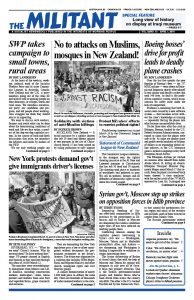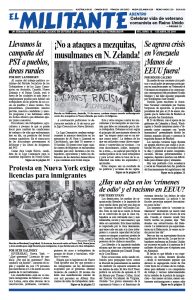Stepped-up bombing of Syrian rebel-held communities in Idlib province by the government in Damascus and its backer in Moscow are deepening the ruinous conditions eight years of war have inflicted on working people there.
Conflicting interests among the capitalist powers intervening in Syria’s civil war — Washington, Moscow, Tehran and its Hezbollah paramilitary allies, and Ankara — are sharpening, and Washington is finding it impossible to withdraw its troops intervening there.
The Syrian dictatorship of Bashar al-Assad claims that with the help of Moscow and Tehran his regime will reimpose its rule over all of Syria. It faces two primary obstacles. One is the Turkish government-backed groups and Islamist forces who’ve been driven from across the country into Idlib. The other is the U.S.-backed Kurdish-led Syrian Democratic Forces that control the northeastern Syrian region and much of the territory and oil fields south of there wrested in combat from Islamic State.
The Russian government ordered airstrikes on Idlib March 13, its first since Moscow had agreed to a “de-escalation zone” in the province with Turkish rulers last year. At least 13 people were killed. Like “de-escalation” deals imposed elsewhere in the country this one has been a prelude to further destruction inflicted by Assad and Moscow.
Militias backed by the Iranian rulers — to bolster their regional expansion — reinforced Moscow’s airstrikes with ground assaults on areas of Idlib held by Hayat Tahrir al-Sham, the former al-Qaeda group.
The Turkish rulers have intervened in Syria to arm groups fighting Assad, and to deal blows to Kurds who have been fighting for their national rights.
The Kurdish people, divided across Iraq, Iran, Syria and Turkey have fought to assert their national sovereignty denied by the capitalist rulers there for decades. The Kurds are the largest nationality denied their own state in the world.
The Syrian government has intensified its own airstrikes on people in Idlib since mid-February, forcing some 100,000 to flee their homes. Nearly half of the 3 million people living in the densely populated province fled there to escape Moscow’s and Assad’s war drive elsewhere in the country.
This civil war followed a 2011 popular uprising by working people who courageously fought to overturn Assad’s repressive rule. He crushed their rebellion, but different opposition forces took up arms and wrested control of large parts of the country. Assad was able to begin retaking territory after Moscow intervened and began intensive bombing of rebel-held areas.
Washington stuck in a quagmire
Syrian Democratic Forces launched assaults on the Islamic State-held town of Baghouz near Syria’s Iraqi border March 11. Unwilling to deploy troops in a ground war to defeat IS, the U.S. rulers have concentrated on using their deadly airpower to back the Syrian Democratic Forces doing the fighting to oust IS.
Former residents say hundreds have been killed and nearby villages razed to the ground in the bombing by the Washington-backed forces. Tens of thousands have fled, many to the al-Hol refugee camp, which was built for 20,000 people but is now home to 65,000. Scores have died on the journey.
The U.S. government said it would withdraw all 2,000 of its troops stationed in Syria by April, saying the war against IS was over. But now Washington finds itself stuck. Officials told the Wall Street Journal March 17 that up to 1,000 U.S. troops will remain in the country.
The Turkish regime of Recep Tayyip Erdogan insists it will invade Syria to crush the SDF. It claims the group is a pawn for the Kurdistan Workers’ Party (PKK) in Turkey, which has waged a war against Ankara on and off for decades.
Washington tried to convince Ankara that British and French troops of its allied “coalition” in the Syria war would police a demilitarized zone to be established on the Syrian Kurds’ border with Turkey, but both London and Paris as well as Ankara demurred.
U.S. troops will be deployed near the Turkish border to keep Ankara and the Kurds apart — as long as the Kurds continue to serve the needs of Washington. Army Lt. Gen. Paul LaCamera, commander of U.S. forces in Iraq and Syria, threatened to halt all U.S. military assistance to the SDF in February if its leaders sought to bloc with Assad or Moscow to fend off Ankara’s threats.
The U.S. rulers will also maintain their base at al-Tanf on Syria’s southern border with Iraq, as a counter to incursions by the Iranian rulers’ forces into Syria.
The continued intervention by Washington, as well as Moscow, Tehran and Ankara, leads to carnage for working people in Syria and is an obstacle to finding the road to defend their own interests and organize to bring down the Assad dictatorship.

